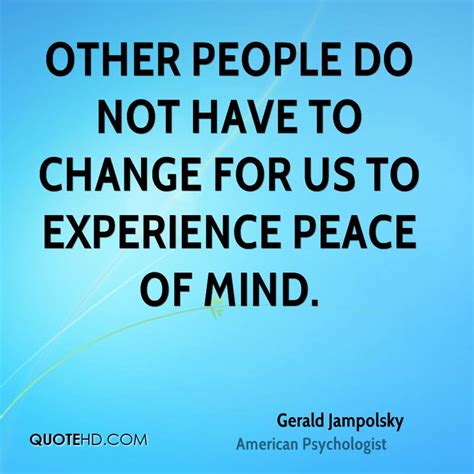A Quote by David Hume
If ... the past may be no Rule for the future, all Experience becomes useless and can give rise to no Inferences or Conclusions.
Quote Topics
Related Quotes
We can say that true gratitude does not give rise to the debtor's ethic because it gives rise to faith in future grace. With true gratitude there is such a delight in the worth of God's past grace, that we are driven on to experience more and more of it in the future...it is done by transforming gratitude into faith as it turns from contemplating the pleasures of past grace and starts contemplating the promises of the future.
When we think we have been hurt by someone in the past, we build up defenses to protect ourselves from being hurt in the future. So the fearful past causes a fearful future and the past and future become one. We cannot love when we feel fear.... When we release the fearful past and forgive everyone, we will experience total love and oneness with all.
There is nothing which an untrained mind shows itself more hopelessly incapable, than in drawing the proper general conclusions from its own experience. And even trained minds, when all their training is on a special subject, and does not extend to the general principles of induction, are only kept right when there are ready opportunities of verifying their inferences by facts.
Life is the future, not the past. The past can teach us, through experience, how to accomplish things in the future, comfort us with cherished memories, and provide the foundation of what has already been accomplished. But only the future holds life. To live in the past is to embrace what is dead. To live life to its fullest, each day must be created anew.
Out of the huts of history's shame I rise Up from a past that's rooted in pain I rise I'm a black ocean, leaping and wide, Welling and swelling I bear in the tide. Leaving behind nights of terror and fear I rise Into a daybreak that's wondrously clear I rise Bringing the gifts that my ancestors gave, I am the dream and the hope of the slave. I rise I rise I rise.
It is not really difficult to construct a series of inferences, each dependent upon its predecessor and each simple in itself. If, after doing so, one simply knocks out all the central inferences and presents one's audience with the starting-point and the conclusion, one may produce a startling, though perhaps a meretricious, effect.
It is not often that nations learn from the past even rarer that they draw the correct conclusions from it. For the lessons of historical experience, as of personal experience, are contingent. They teach the consequences of certain actions, but they cannot force a recognition of comparable situations.
If you have come to these pages for laughter, may you find it. If you are here to be offended, may your ire rise and your blood boil. If you seek an adventure, may this song sing you away to blissful escape. If you need to test or confirm your beliefs, may you reach comfortable conclusions. All books reveal perfection, by what they are or what they are not. May you find that which you seek, in these pages or outside them. May you find perfection, and know it by name.
The asking and the answering which history provides may help us to understand, even to frame, the logic of experience to which we shall submit. History cannot give us a program for the future, but it can give us a fuller understanding of ourselves, and of our common humanity, so that we can better face the future.
Our past cannot be changed, and to be preoccupied with it is inefficient in time and effort. Likewise, by fretting over the future, we only exhaust ourselves, making us less able to effectively respond when the future is actually upon us. By worrying about a mishap that may or may not take place, we're forced to undergo the event twice-once when imagining it and once again if and when we actually experience it.









































